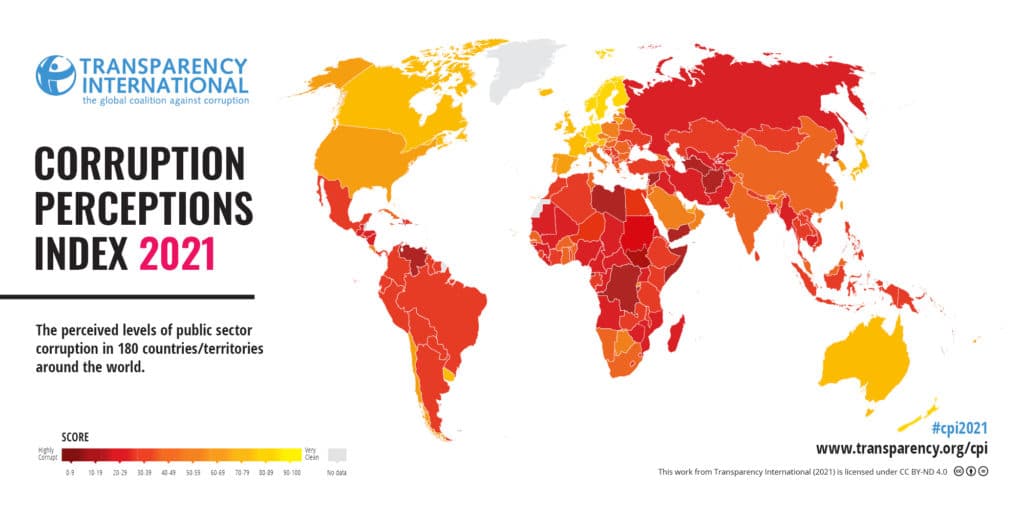What exporters need to know about dealing with bribery and corruption
Corruption is one of the biggest risks for companies doing business abroad. According to an article by the UN Development Programme, of the approximately US$13 trillion that governments spend on public spending, up to 25 percent is lost to corruption. The article also states that international bribery is thriving — more than half of all cases are related to public spending.
Corruption can take many forms but generally involves the abuse of an entrusted power for private gain. Bribes are one example. There’s also fraud, and “perks” or gifts—like a trip to Disneyland— which can, in some circumstances, be kinds of corruption.
By interfering with the free market, corrupt business practices make it impossible for conscientious companies to bid successfully on projects. That ultimately leads to higher costs and slows down economic development. Every person and business involved directly or in a corrupted deal is affected, and reputations can be ruined throughout the entire supply chain.
Most countries have anti-corruption laws. Breaking them could land you in jail or facing hefty fines. It’s a criminal offence in Canada to corrupt or try to corrupt a foreign public official.
Assess your corruption risk
Where you’re doing business
Some countries are riskier for public-sector corruption than others. Transparency International created the map below to rank countries for perceived likelihood of public-sector corruption, with red being most likely and yellow least likely.
Source: Transparency International
Your industry or sector
Extractives, construction and defence have the greatest likelihood of corruption. These sectors have a lot of regulations—such as the need for permits—and sometimes individuals try to get around the rules with bribes or improper payments.
Who you’re working with
If you employ local agents, make sure they are trustworthy and aligned with your business values. The actions of a local agent can harm your company reputation or implicate you legally. Of U.S. and U.K.-reported cases alleging improper payments, about 90% involved the use of agents, representatives or third-party intermediaries.
How to protect yourself
Know your partners
Ask probing questions to understand who you are dealing with—not just your buyer but also key representatives throughout the supply chain: suppliers, subcontractors, agents/ representatives and third-party intermediaries. Because the greatest external risk comes from the use of agents, representatives and third-party intermediaries, screen these individuals thoroughly. Important due diligence questions to ask include:
- What are the names and addresses of all organizations involved?
- Who owns those companies?
- How long have they been in business?
- Have any had reports of unethical business practices related to the company or its executives?
- Have I checked references?
- Does the compensation make sense, and how is it justified?
The World Economic Forum offers some great advice in its Good Practice Guidelines on Conducting Third-Party Due Diligence.
Know your customer
Knowing your customer is part of a larger regimen of due diligence—making sure you’ve adequately checked out an opportunity to keep your business safe from corruption risk. You can hire suppliers who specialize in third-party due diligence reviews, but here are some questions to frame your approach
- What is the Transparency International Corruption Perception Index score for the country?
- How extensive is your network of government contacts for the project, and how many present potential risk?
- What business stage is the project at, and what pressures might present potential risk?
- How much direct control does your company/employees have over the project/business assets to manage potential corruption and bribery risks?
- Are there past or recent corruption allegations against the government officials in decision-making roles on the project?
Develop anti-corruption policies
Whether your business is small or large, you should have written anti-corruption policies when you start exporting. This should address how you use agents or representatives and outline controls and procedures for gifts, hospitality and travel involving foreign public officials. Make sure your employees know what your policies are and are trained appropriately.
Check out the links below for free information to help you develop relevant policies and training programs:
- Export Development Canada (EDC) – Avoid bribery risk in international markets with this tool
- Organization for Economic Co-operation and Development (OECD) – Good Practice Guidance on Internal Controls, Ethics, and Compliance
- International Chamber of Commerce (ICC) – Rules on Combating Corruption
- Transparency International – Business Principles for Countering Bribery
- Royal Canadian Mounted Police (RCMP) – Tools and resources to combat and prevent corruption
The risks of corruption in world markets are real. The good news is they can be reduced. Having policies in place, implementing them and exercising due diligence are all ways you can protect yourself and your company.
Every year we help Canadian companies win millions in contracts with foreign governments. Download our guide to learn more about our approach, how we prepare you, and priority sectors.
How G2G contracting reduces bribery risks
A G2G contract through CCC eliminates that risk thanks to Canada’s strong international reputation and commitment to being an ethical, reliable business partner.
We take on the role of the prime contractor with our G2G contracts, which means the Government of Canada is right there with your buyer every step of the way, from initial meetings and negotiations through the entire life of the contract. Because we take on all performance oversight and financial administration of the contract — all invoicing and cash flows are executed through us — the risk of bribery and corruption is greatly reduced.
Our experience structuring and managing complex international contracts also ensures your buyers have a partner who can help resolve any contracting issues that might arise — and can shield them from potential unethical business practices that might come with working with local suppliers.

Learn more about G2G
We are Canada’s government to government contracting agency. Using our international contracting expertise, we support Canada and Canadian businesses to build successful commercial relationships with governments around the world.
If you are a Canadian company with a sales or an export opportunity with a foreign government or are a government buyer looking to source solutions from Canada, contact us to get the help and resources you need to be successful.
This post was last updated on January 13, 2023.
In this blog you will learn about the government to government contracting process and how it can help to de-risk foreign governments contracts.
In this blog we’ll examine CCC’s signature solution for bringing qualified Canadian companies to government buyers around the world: the government to government (G2G) contracting service.
Let us help you explore ways that the Government of Canada can help you win more international deals.


